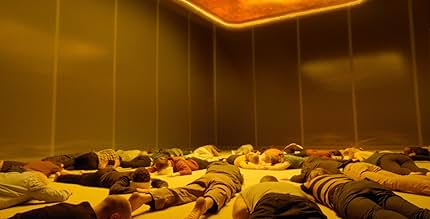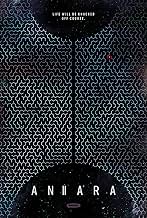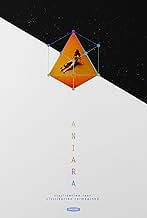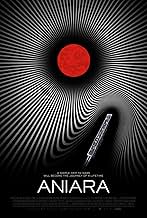Un vaisseau spatial transportant des colons sur Mars est dévié de sa trajectoire. Les passagers consuméristes sont alors forcés de réfléchir à leur place dans l'univers.Un vaisseau spatial transportant des colons sur Mars est dévié de sa trajectoire. Les passagers consuméristes sont alors forcés de réfléchir à leur place dans l'univers.Un vaisseau spatial transportant des colons sur Mars est dévié de sa trajectoire. Les passagers consuméristes sont alors forcés de réfléchir à leur place dans l'univers.
- Réalisation
- Scénario
- Casting principal
- Récompenses
- 11 victoires et 10 nominations au total
Emelie Garbers
- Mimaroben
- (as Emelie Jonsson)
Avis à la une
This is based on a much-loved poem in Swedish written in 1956 (when my school debating club seriously considered "That man will never reach the moon"). Bear that in mind and much makes sense - more sense than the poem ever did to me when I first tried to read it. Much that purports to be science is just poetry. The film-makers have made some attempt to update the plot and the setting, bearing in mind that we have all seen 2001: a Space Odyssey..
The science is still cheesy. The ship has lost all its fuel, but power is uninterrupted and water is abundant (there is not only an extended lesbian shower scene, but a 20m swimming pool!). The architecture of the ship is absurdly angular, but nothing ever springs a leak. The ship's interior has been compared to a shopping mall and a cruise ship, but manufactured goods never show any sign of running out, and the whole thing seems absurdly understaffed.
It's basically an exploration of how an isolated group of people copes when it is cut off from Earth, its memories and hope. The main characters are sufficiently well drawn to explore these themes in, for me, a satisfying way. On those terms, it does well and is worth watching, though you must fill the hints in the chapter headings with your own deductions.
The science is still cheesy. The ship has lost all its fuel, but power is uninterrupted and water is abundant (there is not only an extended lesbian shower scene, but a 20m swimming pool!). The architecture of the ship is absurdly angular, but nothing ever springs a leak. The ship's interior has been compared to a shopping mall and a cruise ship, but manufactured goods never show any sign of running out, and the whole thing seems absurdly understaffed.
It's basically an exploration of how an isolated group of people copes when it is cut off from Earth, its memories and hope. The main characters are sufficiently well drawn to explore these themes in, for me, a satisfying way. On those terms, it does well and is worth watching, though you must fill the hints in the chapter headings with your own deductions.
"There is protection against almost everything, against fire and damage through storm and cold, but there is no protection against humanity," said Nobel Prize winner Harry Martinson, upon whose poem this film is based. On a spaceship accelerating to Mars from the ruined earth, people shop, eat and - with the help of virtual reality - dream as they always have done. When the ship veers off course, crew leaders try to keep the passengers from learning the truth. Power struggles ensue, fantasies and fears displace reality, and the ship starts to resemble (gasp!) a mini city on earth. Caught in the middle of the chaos and the factions is a cheerful woman who tries to make the best of the unfortunate circumstances. If only her companions would let her.
Poignant and relevant to contemporary culture, directors Kagerman and Lilja adapt the poem remarkably well to the screen. The film is wonderful for what it says about human nature. The salient moral is that technology is not fail safe, and only as good as the powers who wield it. The film is hampered by a skimpy budget, shaky camera work and bad transitions, but overall the acting is believable, and it is a fascinating glimpse at the human talent for avoiding reality, for better or worse, in whatever sphere we happen to occupy. World premiere seen at the 2018 Toronto International Film Festival.
Poignant and relevant to contemporary culture, directors Kagerman and Lilja adapt the poem remarkably well to the screen. The film is wonderful for what it says about human nature. The salient moral is that technology is not fail safe, and only as good as the powers who wield it. The film is hampered by a skimpy budget, shaky camera work and bad transitions, but overall the acting is believable, and it is a fascinating glimpse at the human talent for avoiding reality, for better or worse, in whatever sphere we happen to occupy. World premiere seen at the 2018 Toronto International Film Festival.
On one level this movie is a success. It's an engaging, non-commercial Sci-fi film that is well acted, directed and produced. It held my attention and made me want to find out the fate of the ship and crew.
I knew nothing of the poem. I knew nothing other than what the trailer contained. It is incredibly difficult to adapt a poem which is tied more than any other literary form to the word, into a mostly visual medium. Since the screenwriter seemed to jettison the words of the poem what we are left with is an outline. That's where some problems begin. The poem was written in 1956, when space travel hadn't even started. So, it's pretty lame when a space ship the size of the Aniara doesn't have redundant power and a number of backup plans for when/if things go wrong. But hey, we're already in outer space, disbelief is suspended, so, shut the hell up. There's a bunch character driven scenes but none of character ever develop. The really all stay the same no matter what they've been through. Also Instead of a fully developed story we get inundated with a series of let downs which really come off as more of a drag than tragic. I mean would it really be that bad to be traveling through space? The filmmakers certainly seem sure it is. There's some poignant moments throughout, to be sure. The problem is it's all for a movie that just peters out. What may have had great resonance on the page doesn't make it through the translation to screen.
I think if they had stronger conclusion to what happens to the main character at the end the movie would've worked better. That way the ultimate ending would've become a post script. That didn't happen, so we're left with a movie that just stops on some sort of note about 'the vastness of space'.
All this makes 'Aniara' unsatisfying even though it's well done on many levels.
I knew nothing of the poem. I knew nothing other than what the trailer contained. It is incredibly difficult to adapt a poem which is tied more than any other literary form to the word, into a mostly visual medium. Since the screenwriter seemed to jettison the words of the poem what we are left with is an outline. That's where some problems begin. The poem was written in 1956, when space travel hadn't even started. So, it's pretty lame when a space ship the size of the Aniara doesn't have redundant power and a number of backup plans for when/if things go wrong. But hey, we're already in outer space, disbelief is suspended, so, shut the hell up. There's a bunch character driven scenes but none of character ever develop. The really all stay the same no matter what they've been through. Also Instead of a fully developed story we get inundated with a series of let downs which really come off as more of a drag than tragic. I mean would it really be that bad to be traveling through space? The filmmakers certainly seem sure it is. There's some poignant moments throughout, to be sure. The problem is it's all for a movie that just peters out. What may have had great resonance on the page doesn't make it through the translation to screen.
I think if they had stronger conclusion to what happens to the main character at the end the movie would've worked better. That way the ultimate ending would've become a post script. That didn't happen, so we're left with a movie that just stops on some sort of note about 'the vastness of space'.
All this makes 'Aniara' unsatisfying even though it's well done on many levels.
This is a type of apocalyptic storytelling that is so beautiful. It doesn't hinge on false futurisms or morality - it is based on the sorrows that define our lives when we lose all hope. A slow burn that is so worth the indulgence.
The name Aniara comes from the ancient Greek for "sad and despairing" and it lives up to the title.
I haven't read the poem that it is based on, but it is a really solid sci-fi. The acting is good throughout, and I never felt that I was watching a low budget movie.
This is a perfect example of what independent films should be.
Le saviez-vous
- AnecdotesThe film is based on a 1956 poem by Swedish writer Harry Martinson. The epic, book-length poem has 103 cantos.
- ConnexionsFollows Aniara (1960)
- Bandes originalesTundra
by Alexander Berg
Performed by Dorisburg
Meilleurs choix
Connectez-vous pour évaluer et suivre la liste de favoris afin de recevoir des recommandations personnalisées
- How long is Aniara?Alimenté par Alexa
Détails
Box-office
- Montant brut aux États-Unis et au Canada
- 40 124 $US
- Week-end de sortie aux États-Unis et au Canada
- 19 297 $US
- 19 mai 2019
- Montant brut mondial
- 40 124 $US
- Durée1 heure 46 minutes
- Couleur
- Rapport de forme
- 2.39:1
Contribuer à cette page
Suggérer une modification ou ajouter du contenu manquant

Lacune principale
By what name was Aniara : L'Odyssée stellaire (2018) officially released in India in English?
Répondre





























